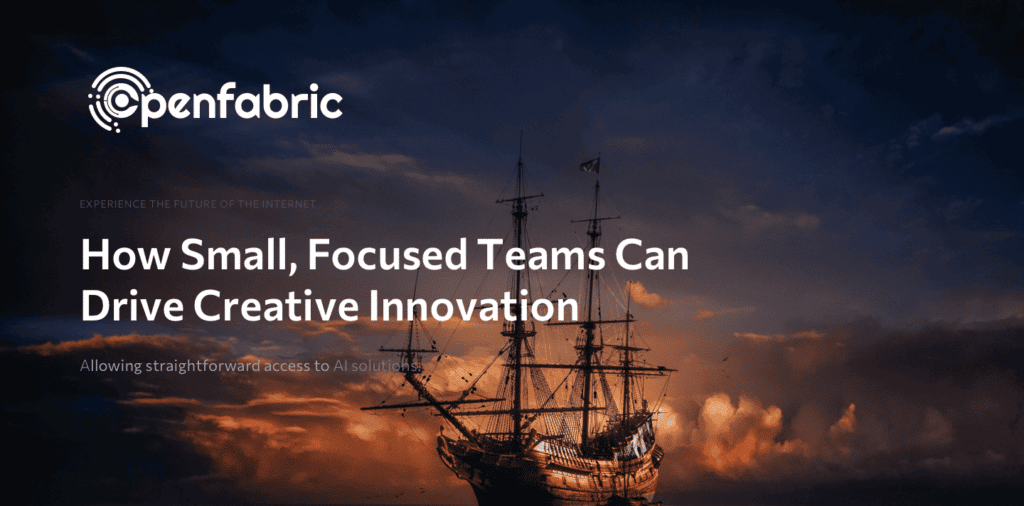
June 17, 2021 5 minutes read
How Startups and Focused Teams Can Drive Creative Innovation

Small, focused teams, for example, startups, can by their very design and composition create better improvements than larger teams.
Here we are going to talk about why this is the case.
In addition, we will see how Openfabric’s self-selected team of highly professional developers hope to empower others.
How?
By helping them unlock vast amounts of untapped value in every industry and application.
Technology and Scaling
One of the reasons that technology is so disruptive is because it scales. Why can an athlete earn so much more — on the order of hundreds or thousands of times more — than, say, a plumber, or even a highly specialized surgeon? The plumber and surgeon can only provide services to one customer or client at a time. However, by simultaneously airing the awesome abilities and exploits of the athlete to millions, sports teams, advertisers, and athletes can all earn increasingly more than they would otherwise have been able to.
The internet can provide you with a truly global audience like the printing press, radio, and television, technology mainly in the form of computers.
How Startups Are Designed
This concept of scaling in the tech space is particularly apparent in tech startups. In the absence of middle managers, management, and many average Janes and Joes, highly motivated startup coders and developers can crush in a short time what others may only achieve in a lifetime.
Startup employees can often choose their own hours, the problems to work on, and who to work with. They can work free of processes and standards that may add value to larger institutions. These processes may remove chaos but only create problems for the independent and creative minds of startup teams.
Workers in large companies can get by doing an average day’s work. They are not expected to devote everything they have to their job. However, devoting yourself to your work and squeezing more focused work into less time can deliver significant economies of scale. The right people, in the right setting, with the right tools, solving the right problem, can generate ten or even one hundred times as much value as an average worker. A motivated programmer, for instance, instead of maintaining a legacy system, can write an entirely new piece of software, changing an industry in the process.
The problem is that larger teams and companies are not built to reward this kind of good behavior. This is why we rarely see such risks (and their following rewards) with larger enterprises.
But with startups? They happen all the time. Startups are also aided by the fact that everybody’s contribution to a project and the impact of their contributions to the ultimate outcome of the project are easy to measure. This makes it easier to align compensation with impact, and in startups. As such, every person’s impact is amplified the smaller the team is.
This fact neatly ties in with the concept of scaling we talked about earlier. The contributions of startup team members more pronounced than the contributions of developers who are part of a larger organization. However, the startup worker’s contributions are further amplified because they scale with the technology they are used on.
Barriers to Entry
Is doing any of this easy? Certainly not.
That is why the barriers to entry to launching a startup are so high. Startups are not designed to take a hit. They can only produce a hit. If they do not, they go under.
Large companies can have many product failures and still survive. Startups only get one chance. And to get it right, everyone on the team must give it their all and tirelessly work days, months, and years toward solving a hard but rewarding problem.
This is what startups do. It is not what big companies do. And that is why startups, by tackling hard problems and building small, nimble teams of highly focused developers who are in the very top percentiles of their respective fields, can create innovative and ground-breaking new technologies that simply stump everyone else, regardless of how large or well-funded they may be.
It is within this context that the Openfabric team is first of all comprised of driven and focused researchers and developers. These individuals have dedicated years toward commoditizing access to advanced AI to help users. Irrespective of industry, tech ability, or use case, users can leverage the power of AI to bring about meaningful change and create wealth — true benefit.
Why AI?
Hemant Taneja, a Silicon Valley entrepreneur, startup founder, writer, and thought leader, has written on the power of AI to drive disruption unlike anything we’ve seen. His book, “Unscaled: How AI and a New Generation of Upstarts Are Creating the Economy of the Future,” explores how modern founders can and have used AI-based mass personalization techniques to drive innovation and build platforms. These platforms are focused on driving change and creating value across all sectors of the economy.
His thesis is that if entrepreneurs and venture capitalists adopt the right frameworks, we can drive a new wave of innovation that can change the world But this can only be achieved with accountability, transparency, and access to AI technologies.
To put it another way, technological advancements have given us economies of scale and mass personalization. This in turn, allow fast-moving startups to take on large, entrenched incumbents across every sector of the economy. This is how companies such as Airbnb, Uber, Netflix, and Coinbase have disrupted large industries related to them. By empowering startups and these kinds of platforms with advanced AI capabilities, there is no telling what we can achieve.
The Openfabric Mission
With access to the right tools, startup teams can create better services than the best alternatives available today. All we need is to make AI accessible to anyone who needs it. Irrespective of whether the user has any formal training in AI or not. Just as basic internet access — even without formal training — drove many of the technological innovations the world has seen over the last two decades. Basic AI access promises to drive a similar if not greater wave of change and progress.
This is the Openfabric mission, and our platform is perfectly positioned to help anyone who wishes to boldly go where few have ventured. To also help researchers, startups, and dreamers across the globe tap into the enormous power of AI. With this power they can create products, services, and solutions that may only seem like science fiction today.
To learn more about our vision of seamless, effective, and hassle-free AI access for all, please visit us at openfabric.ai.

